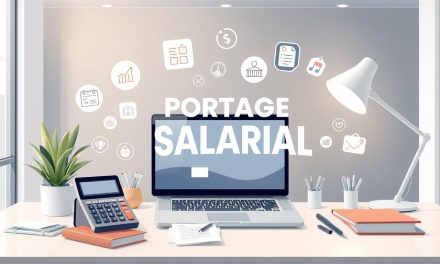Imagine waking up excited to tackle client projects while knowing your healthcare coverage and retirement savings grow steadily. For many French professionals, this balance between autonomy and security felt impossible – until now.
Salary porting offers a modern solution for those craving independence without losing workplace protections. This innovative model lets you focus on delivering exceptional results while a specialized company handles payroll, contracts, and legal compliance.
Through a unique three-way partnership, you maintain creative control over your work while gaining employee benefits like health insurance and paid leave. It’s particularly valuable for consultants navigating multiple client relationships or executives transitioning between corporate roles.
Table of Contents
Key Takeaways
- Blends freelance flexibility with traditional employment protections
- Eliminates administrative tasks through dedicated support companies
- Legally recognized framework ensures compliance with French labor laws
- Ideal for project-based professionals and career transitioners
- Simplifies tax reporting while maintaining income stability
This approach has transformed how over 1.2 million French professionals structure their careers. Whether you’re negotiating a major contract or exploring new industries, salary porting provides the safety net to pursue opportunities fearlessly.
Introduction to the Concept of Salary Porting
France’s workforce is embracing a hybrid model that redefines traditional work structures. Over 300,000 professionals now use wage portage annually, blending entrepreneurial freedom with employee safeguards. This system answers today’s demand for adaptable employment solutions without sacrificing social protections.
Core Components of the System
Three entities form every arrangement:
- Contracted professionals deliver specialized services
- Portage companies handle payroll and legal compliance
- Client companies access skills without permanent hires
Essential Terminology Explained
The contracted employee status forms the foundation. Commercial service contracts outline project specifics, while management fees cover administrative support. Recent legal updates ensure alignment with France’s evolving labor standards.
This model particularly benefits consultants in tech, marketing, and engineering sectors. It enables smooth transitions between corporate roles while maintaining continuous social security coverage. For businesses, it offers cost-effective access to niche expertise through structured, short-term engagements.
Exploring the Legal Framework and Regulations

Navigating France’s employment laws requires precision, especially when adopting innovative models like wage portage. The system operates under strict guidelines designed to protect professionals and businesses alike.
Legal Texts and Collective Agreements
Two pillars define wage portage legality. The 2015 ordinance n°2015-380 established employee status for contracted professionals. Three years later, the 2017 branch agreement standardized industry practices across all portage companies.
Key protections include:
- Guaranteed social security coverage matching traditional employment
- Clear division of responsibilities between professionals and management firms
- Mandatory dispute resolution processes
Compliance and Declarations to the Labor Inspectorate
Portage companies must meet rigorous operational conditions before accepting clients. They submit detailed declarations covering:
| Requirement | Legal Basis | Key Details |
|---|---|---|
| Activity Declaration | Art. L1251-54 | 15-day review period |
| Financial Security | 2017 Agreement | €94,200 minimum guarantee |
| Employee Protections | Ordinance 2015-380 | Salary continuity assurance |
These rules ensure companies maintain sufficient funds to cover 10% of annual payroll. For personalized guidance, consult employment law specialists familiar with portage regulations.
Regular audits verify compliance with labor standards. This framework creates secure conditions for professionals exploring independent careers without sacrificing employment benefits.
Salary Porting: Understanding the Process
Mastering wage portage requires knowing its seven-stage workflow. This structured approach transforms freelance opportunities into secure engagements while maintaining your professional autonomy.
From Mission Search to Contract Formation
Your journey begins by identifying projects matching your expertise. Client companies often seek specialists through professional networks or portage platforms. Once you secure interest:
- Negotiate directly with clients on deliverables, timelines, and compensation
- Present terms to your portage company for validation
- Finalize dual contracts: your employment contract and the commercial service agreement
Portage firms typically require missions exceeding €1,000 to ensure financial viability. This threshold protects both professionals and client companies from unsustainable engagements.
Step-by-Step Workflow and Key Milestones
The operational phase combines service delivery with administrative support. Consider this typical progression:
| Phase | Key Actions | Responsible Party |
|---|---|---|
| Service Execution | Deliver agreed-upon work | Professional |
| Billing Cycle | Invoice client company | Portage company |
| Payment Processing | Convert fees to salary | Portage company |
| Ongoing Management | Track progress & compliance | All parties |
Digital tools streamline communication throughout the process. One consultant notes: « The dashboard shows real-time project status – no more chasing payment updates. »
This framework lets you focus on delivering exceptional service while the company handles bureaucratic complexities. Regular reporting ensures transparency at every stage.
Key Benefits and Advantages of Salary Porting
Professionals across France are discovering a career model that merges entrepreneurial freedom with traditional job security. This approach eliminates the either-or choice between independence and workplace protections, offering a third way for modern careers.
Social Security and Employment Protections
The system delivers essential safeguards through three core mechanisms:
| Protection Type | Traditional Employment | Wage Portage |
|---|---|---|
| Health Coverage | Full | Identical |
| Unemployment Insurance | Standard | Enhanced |
| Paid Leave | 20-25 days | Equal entitlement |
| Retirement Plans | Standard | + Supplementary options |
Your social security coverage remains uninterrupted between projects. Portage companies manage contributions to URSSAF and pension funds, ensuring compliance with French labor standards. One consultant remarked: « I maintain full health benefits while choosing clients that align with my expertise. »
Flexibility and Independence for Professionals
This model lets you dictate project terms while accessing employee benefits. Key advantages include:
- Customizable work schedules aligned with personal commitments
- Direct rate negotiations with client companies
- Access to parental leave without career interruption
Professionals retain control over their workload while the portage firm handles tax filings and legal declarations. Those exploring new career paths benefit from continuous unemployment insurance coverage during transitions.
The structure proves particularly valuable for consultants managing multiple clients. It provides financial stability during slow periods without sacrificing the autonomy that drives professional satisfaction.
Comparing Salary Porting with Freelance and Traditional Models

Choosing the right work structure shapes your career trajectory and financial security. Professionals often face a crossroads: traditional employment’s stability versus freelancing’s independence. Wage portage emerges as a third path, blending these worlds through its unique tripartite framework.
Contractual Relationships Decoded
Traditional freelancing operates on direct agreements between consultants and clients. Wage portage introduces a third-party company that becomes your legal employer while you retain project control. This structure creates distinct advantages:
| Aspect | Freelance | Wage Portage | Traditional Job |
|---|---|---|---|
| Social Coverage | Self-funded | Full benefits | Employer-provided |
| Payment Security | Variable | Guaranteed | Fixed salary |
| Client Selection | Full control | Managed autonomy | Employer-assigned |
Strategic Advantages for Modern Careers
This model removes freelancing’s administrative hurdles while preserving independence. Key benefits include:
- No business registration or VAT management
- Professional liability handled by your portage company
- Continuous unemployment insurance between projects
One marketing consultant shares: « My comparative analysis revealed wage portage offers 40% more net income than freelancing after accounting for hidden costs. »
For those valuing both creative freedom and social protections, this framework provides a balanced solution. It enables professionals to focus on delivering exceptional services while their support company manages legal and financial complexities.
Financial, Social Security, and Management Fees Explained
Understanding your earnings structure brings clarity to career decisions. The wage portage model operates through transparent financial mechanisms that balance professional independence with fiscal responsibility. Let’s explore how fees and contributions translate into secure compensation.
Calculation of Remuneration and Deductions
Your gross fees follow a clear conversion path. First, management costs (typically 8-12%) cover administrative tasks and liability coverage. Social contributions (≈22%) fund healthcare, pensions, and unemployment benefits. What remains becomes your net remuneration.
| Component | Percentage Range | Covers |
|---|---|---|
| Management Fees | 8-12% | Contract setup, invoicing, legal support |
| Social Contributions | 20-24% | Health insurance, retirement plans |
| Net Remuneration | 64-72% | Personal income after deductions |
Portage companies must provide monthly statements showing:
- Client payments received
- Exact management fee calculations
- Breakdown of all social and tax deductions
Financial Guarantees and Invoicing Details
French law mandates strict safeguards for professionals. Portage firms maintain financial reserves covering 110% of monthly obligations. This ensures timely payments even if clients delay settlements.
| Security Measure | Legal Requirement | Professional Benefit |
|---|---|---|
| Guarantee Fund | €94,200 minimum | Salary continuity assurance |
| Payment Terms | 45-day maximum | Predictable cash flow |
One consultant noted: « Seeing the detailed fee breakdown helped me optimize project pricing while maintaining desired income levels. » Regular financial audits ensure companies meet these protective standards.
Role and Responsibilities of Portage Companies
Portage companies serve as the operational backbone for independent professionals, transforming project-based work into structured career paths. These specialized firms bridge entrepreneurial ambition with employment safeguards through meticulous administration.
Administrative Duties and Contract Oversight
Every partnership begins with a legally binding employment contract outlining rights and obligations. Portage companies exclusively manage:
- Payroll processing and tax declarations
- Social contribution payments to URSSAF
- Individual activity accounts tracking earnings
They convert client invoices into regulated salaries while handling all hiring formalities. This allows professionals to focus solely on delivering exceptional services.
Compliance Assurance and Risk Management
Legal adherence forms the cornerstone of operations. Reputable firms maintain:
- Mandatory financial guarantees (€94,200 minimum)
- Regular labor inspectorate audits
- Professional liability insurance coverage
These measures ensure continuous social protection during career transitions. One consultant notes: « My portage company alerted me to contractual clauses needing adjustment before signing – invaluable risk prevention. »
By combining administrative expertise with legal vigilance, these companies create secure frameworks for sustainable independent careers. Their role extends beyond paperwork to active career support and compliance stewardship.
FAQ
How does salary porting protect my social security benefits?
Salary porting operates under a formal employment contract, ensuring you maintain full access to health insurance, unemployment coverage, and retirement benefits. The portage company handles social contributions on your behalf, aligning with French labor regulations.
What management fees should I expect with this model?
Portage companies typically charge 8% to 12% of your invoiced amount to cover administrative tasks, contract management, and legal compliance. These fees fund payroll processing, client invoicing, and professional liability coverage.
Can I negotiate payment terms with client companies?
While the portage company manages payment collection, you retain control over rate discussions and service agreements. Clear terms about project duration, payment schedules, and termination conditions are established in your tripartite contract.
How does unemployment insurance work in salary porting?
As a salaried employee of the portage company, you accumulate unemployment rights through France’s Assurance Chômage system. This provides financial security between missions, unlike traditional freelance arrangements.
What happens if a client company delays payment?
The portage company acts as payment guarantor, ensuring you receive your remuneration on schedule regardless of client delays. They handle debt collection efforts while protecting your cash flow.
Are paid leave and sick days included in this model?
Yes, your employment contract entitles you to 2.5 paid leave days per month and sick leave coverage. These benefits mirror those in traditional employment, offering stability while maintaining professional independence.
How quickly can I start working with a new client company?
After validating the client contract’s compliance, most portage companies activate your mission within 48 hours. This streamlined process lets you focus on delivering services without administrative delays.





